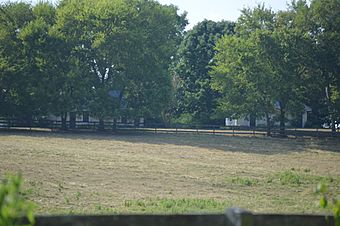Dover Slave Quarter Complex facts for kids
|
Dover Slave Quarter Complex
|
|

Two of the houses
|
|
| Location | 845 Dover Rd., Manakin-Sabot, Virginia |
|---|---|
| Area | 309.5 acres (125.3 ha) |
| Built | 1842 |
| Architectural style | Greek Revival |
| NRHP reference No. | 02001005 |
Quick facts for kids Significant dates |
|
| Added to NRHP | September 15, 2002 |
The Dover Slave Quarter Complex is a group of five historic buildings located on Brookview Farm near Manakin-Sabot, Virginia. These structures were built in 1842 to house enslaved African people. They are an important reminder of the past in Goochland County, Virginia.
Contents
What is the Dover Slave Quarter Complex?
The Dover Slave Quarter Complex includes five old buildings. They were built for people who were enslaved. These buildings are made of brick and have one story. Each building had two separate living areas. They also have steep roofs that come to a point, called gable roofs.
How the Buildings Are Arranged
The five buildings are set up in a wide curve. This curve stretches about 360 feet long. One of the buildings, the one in the middle, was changed later. A second story made of wood was added to it. Its brick walls were covered with siding. This building became the overseer's house. An overseer was a person who managed the enslaved workers. This house also has a newer addition at the back.
How the Buildings Are Used Today
Today, these historic buildings have different uses. The old overseer's house is still there. One of the former slave dwellings is now used as the farm office. Another one is a woodworking shop. The last two buildings are used for storage.
Other Buildings on the Farm
Brookview Farm also has other old buildings from the early 1900s. There is a very long dairy barn. There are also two tenant houses, which were homes for farm workers. You can also see silos, which are tall structures for storing grain, and other storage buildings.
Why is This Place Important?
The Dover Slave Quarter Complex is very important for understanding history. It shows how enslaved people lived and worked in the past. Because of its historical value, these buildings were added to the National Register of Historic Places in 2002. This means they are recognized as a special place that should be protected. The complex helps us learn about the lives of African Americans during a difficult time in history.
 | Stephanie Wilson |
 | Charles Bolden |
 | Ronald McNair |
 | Frederick D. Gregory |



